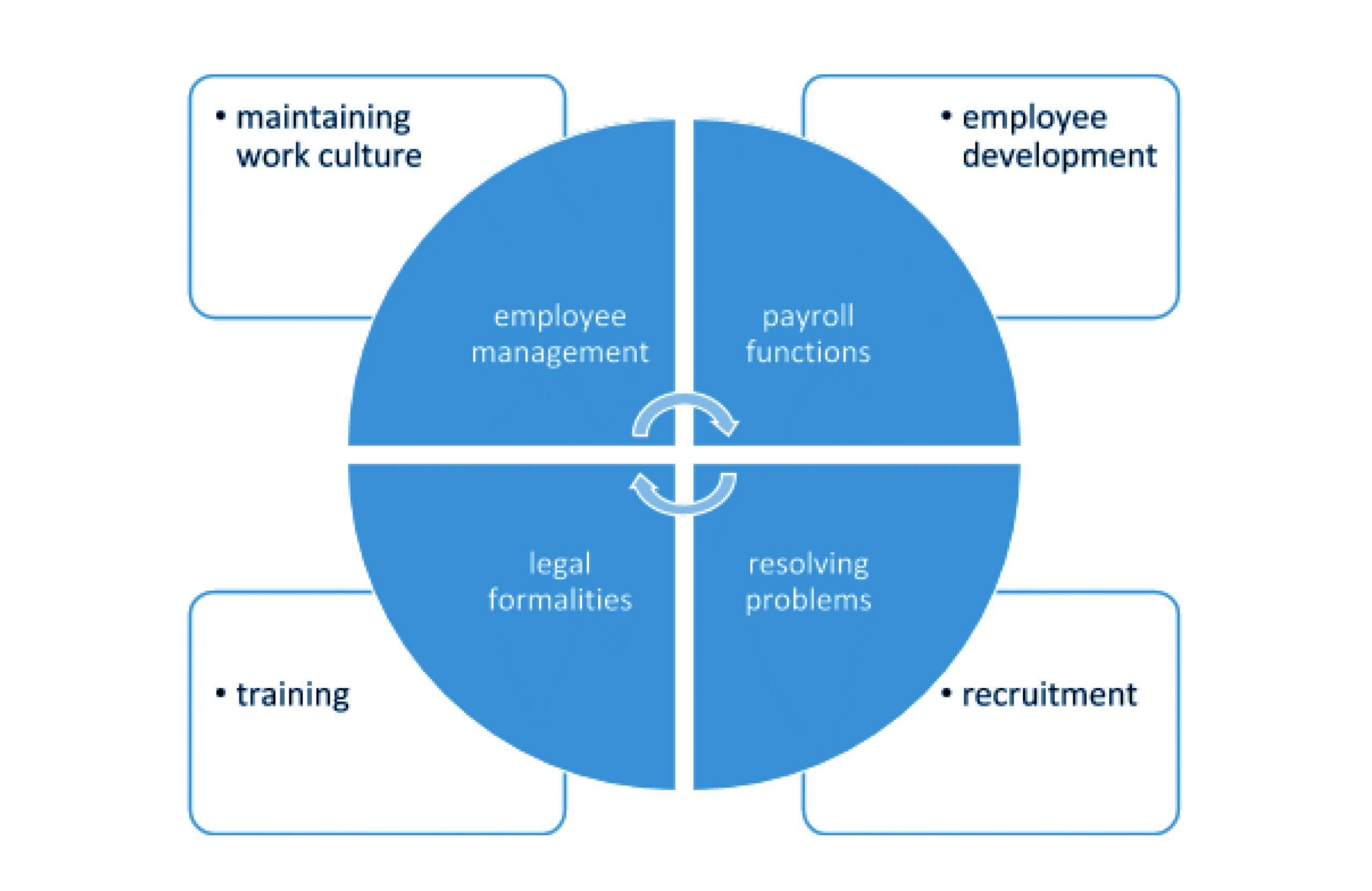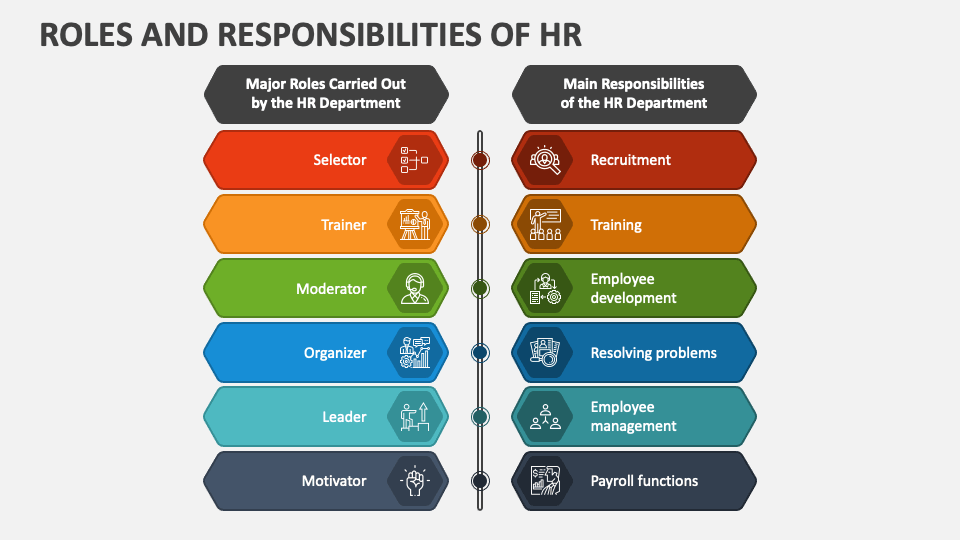Human Resource (HR) professionals play a crucial role in shaping an organization’s workforce and culture. Their roles and responsibilities of HR go far beyond hiring — they manage the entire employee life cycle, from recruitment to retirement., ensuring that both the business and employees achieve success. If you want to work in the HR department, knowing their roles and responsibilities can help you make an informed career decision .In this blog, we’ll explore the key roles and responsibilities of HR professionals.

Key Takeaways
-
Strategic Role of HR: HR is not just administrative—it helps enhance employee productivity, protects the company from workforce-related issues, and drives organizational growth through effective human resource planning.
-
Core HR Responsibilities: Creating job analyses, forming high-performance workgroups, maintaining a positive work culture, recruiting suitable candidates, processing payroll, updating workplace policies, managing compensation, and keeping accurate employee records.
-
Essential HR Skills: Successful HR professionals possess skills such as negotiation, talent management, decision-making, analytical ability, and relationship building. These skills ensure a productive, engaged, and positive workplace environment.
Key Roles and Responsibilities of HR Professionals
If you are wondering what the roles and responsibilities of HR are, they go far beyond just hiring employees or processing payroll. Human Resources plays a vital role in maximizing employee productivity, ensuring workplace harmony, and protecting the company from workforce-related challenges.

Recruitment and Staffing
-
Among the most important roles and responsibilities of HR is finding and hiring the right talent In Maintaining Work Culture.
- Another crucial aspect in the roles and responsibilities of HR is to maintain a positive workplace culture.
- job analysis & Description – Understanding the role, creating accurate job descriptions, and setting hiring requirements.
- Candidate Sourcing – Using job portals, social media, referrals, and recruitment agencies to attract potential candidates.
- Interview & Selection – Screening applications, conducting interviews, and choosing the best fit for the organization.
- Workforce Planning – Ensuring that staffing levels meet current and future business needs.
Employee Onboarding and Orientation
Hiring doesn’t stop once a candidate accepts the offer. HR ensures smooth onboarding.
- Introducing new employees to the company’s culture, policies, and procedures.
- Providing necessary training on tools, systems, and processes.
- Assigning mentors or buddies to help new hires settle in quickly.
- Ensuring employees feel welcomed and valued from day one.
Maintaining Work Culture
One of the most important responsibilities of HR is to maintain a positive and healthy workplace culture. Work culture reflects the values, beliefs, and behaviors that shape how employees interact and perform in an organization.
HR professionals play a key role in:
-
Promoting respect, fairness, and inclusion in the workplace.
-
Encouraging teamwork and open communication.
-
Organizing employee engagement activities to boost morale.
-
Addressing conflicts quickly and effectively to maintain harmony.
-
Supporting diversity and creating an environment where everyone feels valued.
Training and Development
HR professionals are responsible for helping employees grow.
- Conducting skill gap analysis to identify training needs.
- Organizing workshops, e-learning sessions, and professional courses.
- Offering leadership and soft skills training for career advancement.
- Creating succession planning programs to prepare future leaders.
Processing Payroll
Another crucial responsibility of HR is managing payroll to ensure employees are paid accurately and on time. Payroll is more than just transferring salaries—it involves several important tasks, such as:
-
Calculating wages, overtime, and bonuses.
-
Deducting taxes, insurance, and other contributions.
-
Ensuring compliance with labor laws and government regulations.
-
Maintaining accurate salary records for auditing and reporting.
-
Handling employee queries related to salaries, payslips, or deductions.
Compensation and Benefits Management
Employees need to feel fairly rewarded for their work, and HR ensures this.
- Designing competitive salary structures.
- Managing payroll, bonuses, and incentives.
- Providing benefits like health insurance, retirement plans, paid leave, and wellness programs.
- Regularly reviewing compensation packages to retain top talent.
Maintaining Employee Records
HR is also responsible for keeping accurate and updated employee records, which are essential for both legal compliance and smooth operations. Employee records act as a central database for all important information about the workforce.
Key tasks include:
-
Storing personal details such as name, contact information, and employment history.
-
Tracking attendance, leaves, and working hours.
-
Recording performance evaluations and training history.
-
Maintaining documents related to payroll, benefits, and promotions.
-
Ensuring data privacy and confidentiality of employee information.
Implementing Performance Appraisals
Performance appraisals are a key responsibility of HR, aimed at evaluating how well employees are performing in their roles. HR ensures that appraisal systems are fair, transparent, and aligned with the company’s goals.
The process typically includes:
-
Setting clear performance standards and expectations.
-
Collecting feedback from managers, peers, and sometimes even clients.
-
Conducting appraisal meetings to discuss strengths and areas of improvement.
-
Recognizing and rewarding high-performing employees.
-
Creating development plans to help employees enhance their skills.
Employee Engagement and Relations
Happy employees perform better — HR works to maintain workplace harmony.
- Conducting surveys to measure employee satisfaction.
- Addressing conflicts, grievances, and workplace disputes fairly.
- Organizing employee engagement activities such as team outings, celebrations, and recognition programs.
- Building a supportive culture where employees feel valued.
Ensuring Employee Satisfaction
Another vital responsibility of HR is to ensure employee satisfaction, as happy employees are more productive, loyal, and engaged in their work. HR professionals focus on creating a workplace where employees feel valued and supported.
Key responsibilities include:
-
Conducting employee surveys and feedback sessions.
-
Offering career growth and learning opportunities.
-
Recognizing and rewarding employee contributions.
-
Promoting work-life balance through flexible policies.
-
Addressing grievances and resolving issues quickly.
Compliance and Legal Responsibilities
HR ensures the organization follows labor laws and regulations.
- Keeping updated with employment laws, workplace safety rules, and diversity regulations.
- Ensuring contracts, policies, and practices comply with legal requirements.
- Handling audits, employee records, and government reporting.
- Preventing workplace discrimination and ensuring equal opportunities.
Health, Safety, and Employee Well-Being
Employee well-being is becoming a top priority for HR.
- Implementing workplace safety standards (OSHA, labor law guidelines).
- Running employee wellness programs, including physical and mental health support.
- Ensuring work-life balance policies, such as flexible schedules and remote work.
- Promoting awareness about stress management and healthy living.
Assisting Employees with Career Development
HR plays an important role in helping employees grow professionally and achieve their career goals. Supporting career development not only benefits employees but also strengthens the organization by building a skilled and motivated workforce.
Key responsibilities include:
-
Identifying training and learning opportunities for employees.
-
Offering mentorship and coaching programs.
-
Creating career paths and succession planning.
-
Encouraging employees to set personal and professional growth goals.
-
Providing resources like workshops, certifications, or leadership programs.
Strategic HR Partner
Modern HR professionals don’t just manage administration — they help shape the company’s future.
- Aligning HR strategies with long-term business goals.
- Advising leadership on workforce planning, diversity, and culture-building.
- Using HR analytics and data to make better decisions.
Driving change management during mergers, expansions, or digital transformations.
Technology and HR Digitalization
With HR technology growing rapidly, professionals must adapt.
- Managing HR software for payroll, attendance, and employee records.
- Using AI-driven recruitment tools to improve hiring.
- Tracking employee data and generating reports for decision-making.
Implementing digital platforms for employee self-service and engagement.
Conclusion
the roles and responsibilities of HR are multi-dimensional, ranging from recruitment and payroll to employee well-being and strategic planning. Their responsibilities ensure that the organization runs smoothly, employees remain motivated, and long-term growth is achieved.
FAQ:-
1. What are the main roles and responsibilities of HR?
The main roles of HR include recruitment, training, performance management, payroll, compliance with labor laws, employee relations, and career development support.
2. Why are HR roles and responsibilities important?
HR ensures smooth business operations by managing people effectively. They help improve productivity, build a positive work culture, and protect the company from workforce-related issues.
HR professionals need skills like communication, negotiation, decision-making, problem-solving, talent management, and relationship-building to manage employees effectively.